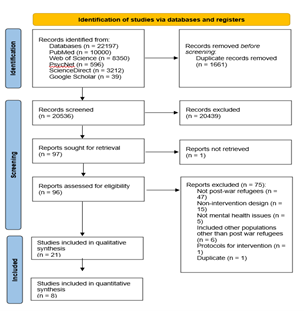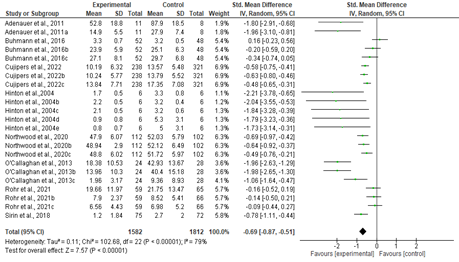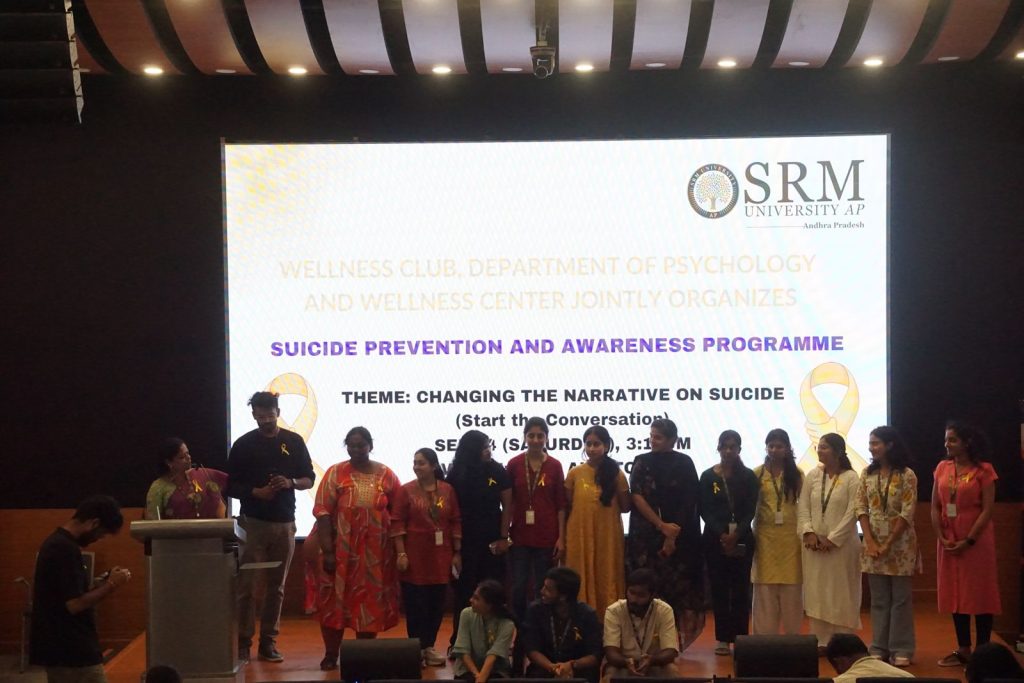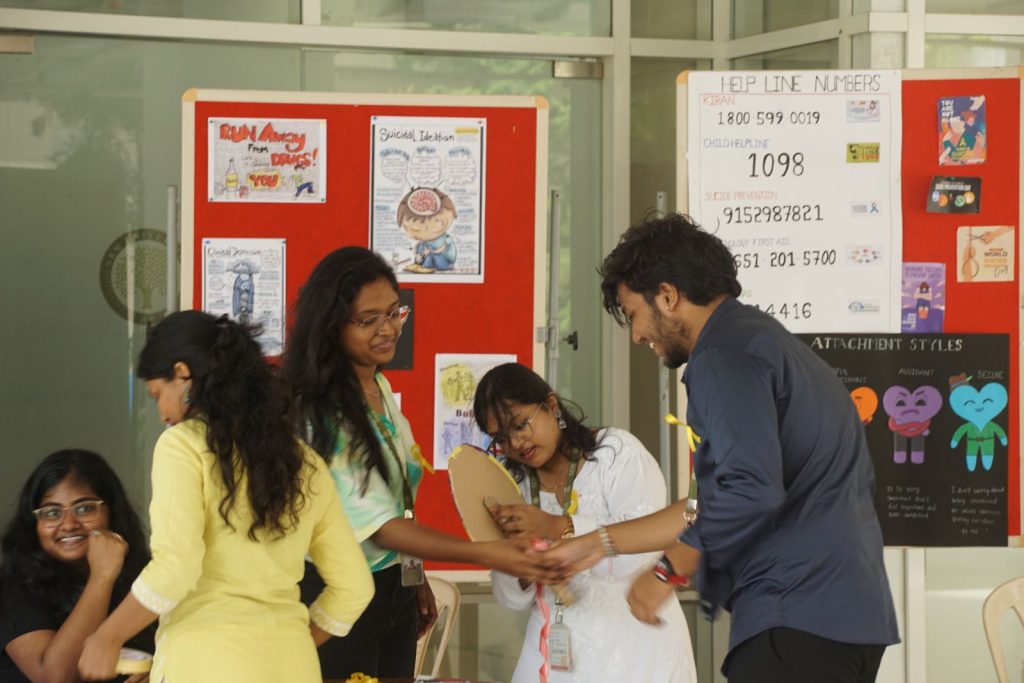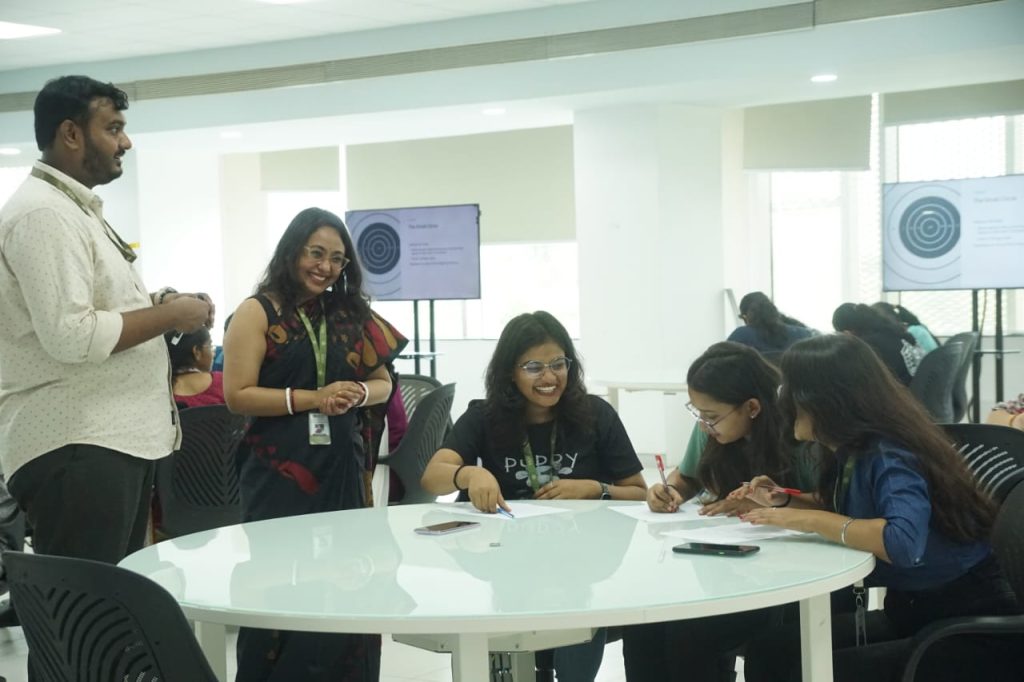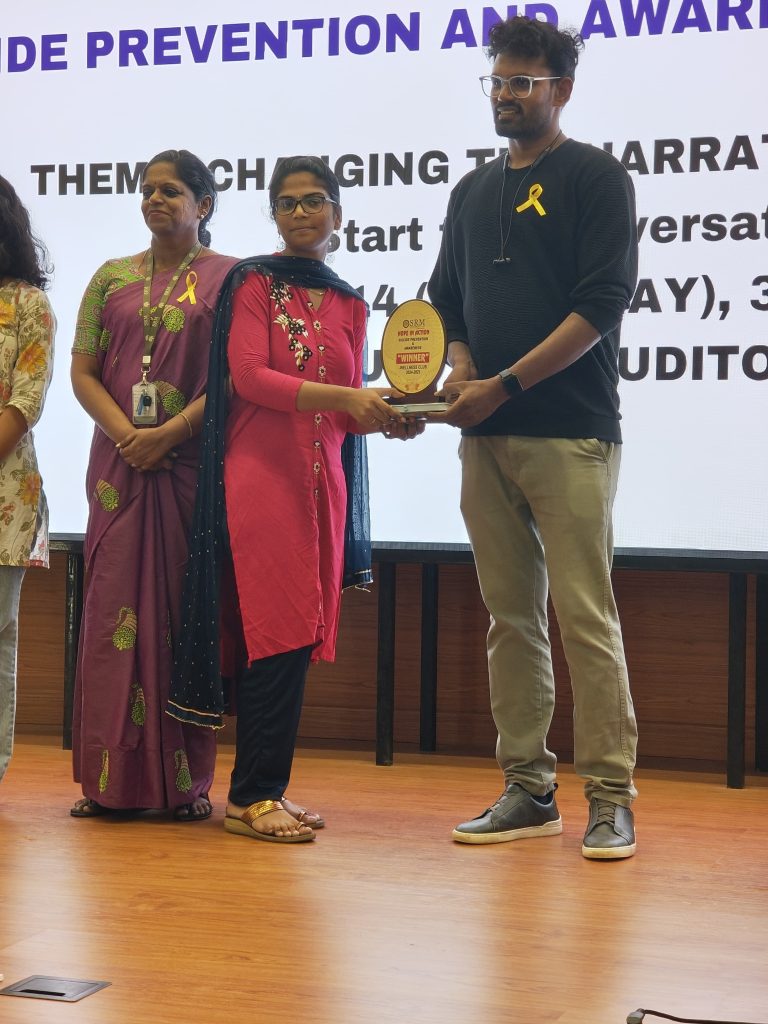- A Meta Analysis on the Mental Health of War Refugees March 21, 2025
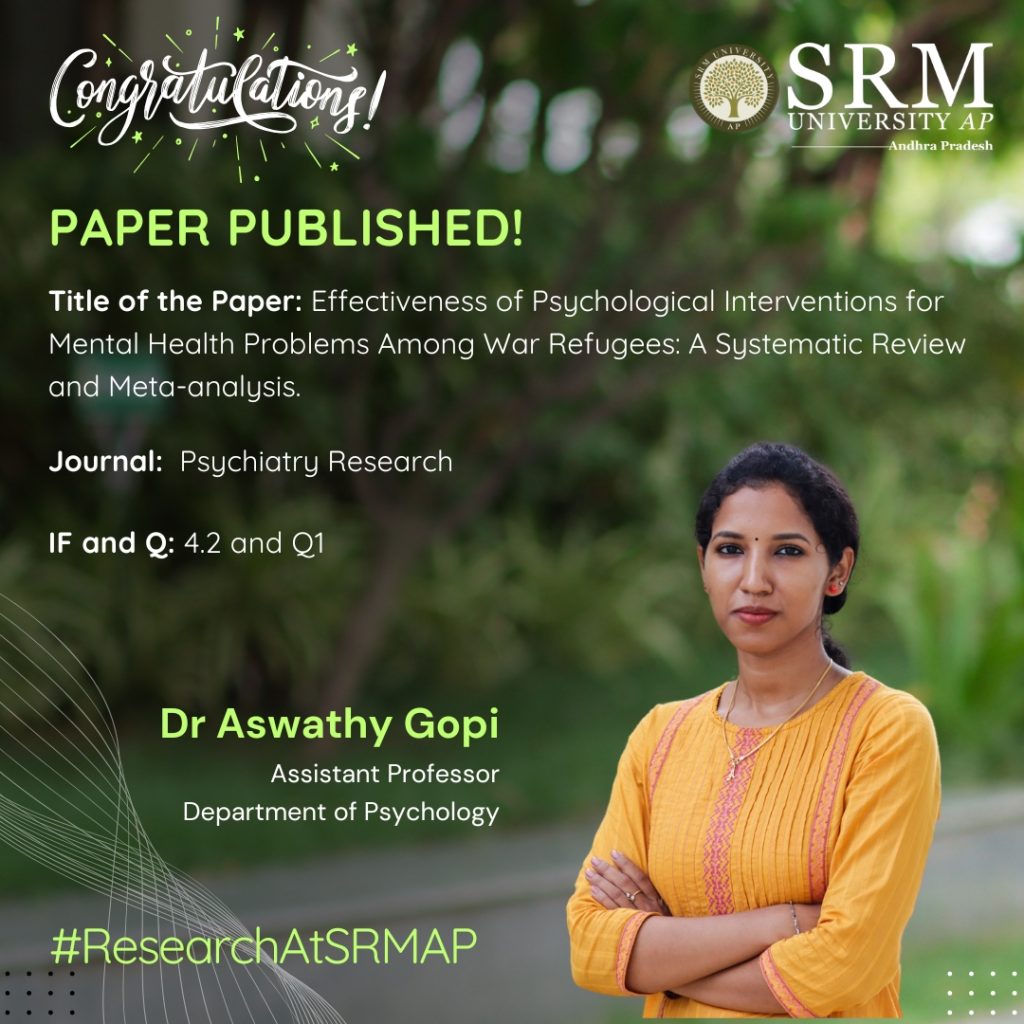 “I object to violence because when it appears to do good, the good is only temporary; the evil it does is permanent.”, this quote by Mahatma Gandhi serves as a stark reality that war leaves individuals grappling in severe trauma. Dr Aswathy Gopi, an Assistant Professor at the Department of Psychology, explores this impact in her research paper titled “Effectiveness of Psychological Interventions for Mental Health Problems Among War Refugees: A Systematic Review and Meta-Analysis.” Her paper sheds light on the profound effects of war on the mental health of refugees, emphasising the need for tailored approaches to support their psychological well-being.
“I object to violence because when it appears to do good, the good is only temporary; the evil it does is permanent.”, this quote by Mahatma Gandhi serves as a stark reality that war leaves individuals grappling in severe trauma. Dr Aswathy Gopi, an Assistant Professor at the Department of Psychology, explores this impact in her research paper titled “Effectiveness of Psychological Interventions for Mental Health Problems Among War Refugees: A Systematic Review and Meta-Analysis.” Her paper sheds light on the profound effects of war on the mental health of refugees, emphasising the need for tailored approaches to support their psychological well-being.Abstract:
War and displacement have led to a global mental health crisis, with 117.3 million individuals displaced and one in five refugees experiencing psychological distress. Despite the availability of psychological interventions, their overall effectiveness remains unclear. This systematic review and meta-analysis evaluate the impact of psychological interventions on war refugees’ mental health. A comprehensive search of PubMed, Web of Science, APA PsycNET, ScienceDirect, and Google Scholar (July 2024) identified 21 studies for systematic review and eight randomized controlled trials for meta-analysis. The results indicate a significant medium effect size of psychological interventions (SMD = -0.69, 95% CI: -0.87, -0.51, p < .00001), with in-person interventions showing a large effect (SMD = -1.03) and telehealth interventions demonstrating a small effect (SMD = -0.44) in reducing the mental health issues among war refugees. Findings support the effectiveness of psychological interventions, emphasizing the need for further research on digital mental health solutions to enhance accessibility for war refugees.
Explanation in layperson’s terms
War forces millions of people to leave their homes, and many of them experience severe stress, anxiety, and depression. In fact, one in five refugees struggles with serious mental health problems. While various psychological therapies exist to support them, it is unclear how effective they truly are. The current review identified the available in-person as well as telehealth-based psychological interventions that help war refugees in addressing their mental health conditions using evidence from 21 studies. A statistical examination of eight high-quality trials found that psychological support significantly helps refugees in reducing mental health issues. Although face-to-face therapy was reported to be the most effective, online therapy also demonstrated positive results, with a smaller effect. Given the limited number of studies on digital interventions, further research is warranted due to factors like displacement and limited healthcare resources of war refugee.
Practical Implementation and Social Implications
Psychological interventions involving both in-person and telehealth showed effectiveness for mental health problems among war-refugees. Policy makers and intervention developers should provide keen attention while designing interventions for mental health issues of war refugees as their challenges are distinct from other refugees and the general population. Further, the government and healthcare authorities can aim for adopting hybrid models integrating both telehealth and in-person interventions for the effective management of mental health problems of war refugees.
Collaborations
This secondary analysis was conducted in collaboration with Indian Institute of Technology Bhilai, Chhattisgarh.
Future research plans
Dr Aswathy Gopi is currently working on positive organisational health, with several research works under review in reputed high-impact journals. The research primarily explores organisational effectiveness and mental health outcomes across various populations. She is also collaborating with IITs and central universities to conduct both primary and secondary research in this domain.
The link to the article
https://doi.org/10.1016/j.psychres.2025.116432Continue reading → - Trio Publish Patent on VR Based Therapy Systems February 28, 2025
 The Department of Psychology at SRM University-AP is proud to announce the publication of the patent titled, “A System for VR-Based Psycho-Oncology Therapy with Real-Time Biofeedback and Cultural Adaptation” by Dr Ayesha Parveen Haroon and her Research Scholars-Ms Brilly Anto and Ms Keziah Mariyam Simon. This groundbreaking research introduces a virtual reality therapy system that integrates real-time biofeedback.
The Department of Psychology at SRM University-AP is proud to announce the publication of the patent titled, “A System for VR-Based Psycho-Oncology Therapy with Real-Time Biofeedback and Cultural Adaptation” by Dr Ayesha Parveen Haroon and her Research Scholars-Ms Brilly Anto and Ms Keziah Mariyam Simon. This groundbreaking research introduces a virtual reality therapy system that integrates real-time biofeedback.Abstract
This research introduces a VR-based psycho-oncology therapy system that integrates real-time biofeedback and cultural adaptation to enhance the psychological well-being of cancer patients. The system utilizes virtual reality to create immersive therapeutic environments while continuously monitoring physiological indicators such as heart rate variability (HRV), skin conductance response (GSR), and respiratory rate to assess stress levels in real time. A processing unit analyzes this data using stress detection algorithms and selects personalized therapeutic interventions, including guided imagery, music therapy, mindfulness practices, and culturally relevant content. The system adapts dynamically to patient responses, ensuring an individualized approach to mental health support. Additionally, a cloud-based module securely stores therapy metrics for long-term monitoring and personalized care adjustments. This innovation offers a patient-centred, technology-driven intervention that enhances mental health outcomes, improves treatment adherence, and provides accessible psychological support for cancer patients in both clinical and home settings.
Explanation in layperson’s terms.
Cancer treatment can be emotionally challenging, leading to stress, anxiety, and depression. This research introduces a Virtual Reality (VR)-based therapy system that helps patients relax and manage stress through immersive environments like calming landscapes and guided meditation. The system monitors heart rate, breathing, and stress levels in real time and automatically adjusts therapy by playing soothing music, guided imagery, or relaxation exercises. It also includes culturally relevant content, making therapy more personalized and accessible, even for patients in remote areas. In short, this system acts as a virtual therapist, offering personalized mental health support to cancer patients during treatment and recovery.
Practical Implementation & Social Impact
Practical Implementation
Used in hospitals, cancer centers, and home-based care for stress management.
Helps psycho-oncologists and mental health professionals provide personalized therapy.
Supports palliative care and extends telehealth access to remote areas.
Social Implications
• Reduces stress and anxiety in cancer patients, improving their quality of life.
• Increases accessibility to mental health support, especially in underserved areas.
• Enhances treatment adherence by promoting emotional well-being.
• Offers culturally relevant therapy, making interventions more relatable and effective.
This system bridges the gap in psycho-oncology care, making mental health support more engaging, accessible, and personalized.
Future Research Plans
• Enhancing VR therapy with AI-driven personalization.
• Integrating EEG-based biofeedback for stress monitoring.
• Developing affordable, portable VR solutions for remote care.
• Conducting clinical trials for validation.
• Expanding telehealth access for home-based psycho-oncology care.
Continue reading → - Exploring the Complexities of Victim Profiling November 28, 2024
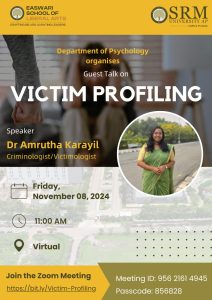 In an era where crime rates and societal concerns about safety have significantly heightened, understanding the psyche of offenders and the dynamics of victimisation has never been more crucial. The Department of Psychology at the Easwari School of Liberal Arts organised an enlightening guest talk delivered by Dr Amrutha Karyil, an expert in Crimes against Women and Children, Victimology, and Victim Assistance. Dr Karyil’s insightful discourse shed light on the complex world of victim profiling, engaging students in a thought-provoking discussion about its historical evolution, methodologies, and ethical dimensions.
In an era where crime rates and societal concerns about safety have significantly heightened, understanding the psyche of offenders and the dynamics of victimisation has never been more crucial. The Department of Psychology at the Easwari School of Liberal Arts organised an enlightening guest talk delivered by Dr Amrutha Karyil, an expert in Crimes against Women and Children, Victimology, and Victim Assistance. Dr Karyil’s insightful discourse shed light on the complex world of victim profiling, engaging students in a thought-provoking discussion about its historical evolution, methodologies, and ethical dimensions.Dr Karyil in her presentation offered a fascinating overview of the history of profiling, tracing its roots back to the Salem Witch Trials and the harrowing case of Jack the Ripper. She elaborated on how profiling serves as a form of behavioural evidence analysis, focusing on the crucial intersection of psychology and criminal investigations. By examining crime scenes, victim backgrounds, and the modus operandi of offenders, profiling seeks to narrow the suspect pool, providing law enforcement with valuable insights into potential perpetrators.
During the talk, Dr Karyil detailed five major types of profiling: psychological, suspect-based, geographical, crime scene, and equivocal death analysis. She stressed that while profiling can be an invaluable investigative tool, it is by no means definitive. Rather, it aids in understanding the underlying patterns of criminal behaviour and assists investigators in their pursuit of justice.
Dr Karyil further explored the broader implications of victim profiling in crime scene analysis. She shared compelling statistics and characteristics of victims targeted by notorious serial killers, urging attendees to recognise the patterns and signatures that often reveal themselves in such cases. The talk underscored the necessity of fostering awareness and specialised training in addressing severe offences, reflecting on the ethical responsibilities that come with careers in forensic psychology.
The event also served as a catalyst for vibrant discussions about the ethical challenges. Students expressed their interest in diverse career paths such as crime scene analysis, offender profiling, and counselling within the criminal justice system. Dr Karyil’s expertise and engaging delivery inspired many to consider how they might contribute to this vital area of society, whether through research, advocacy, or direct service.
Continue reading → - Department of Psychology and the Wellness Centre Partner for Mental Health Awareness Programme October 23, 2024
 The Wellness Club under the Department of Psychology, in collaboration with the Wellness Center at SRM University-AP, hosted a mental health awareness programme aimed at undergraduate students on September 14, 2024. The initiative focused on raising awareness about mental health and suicide prevention while promoting a supportive campus environment for the students.
The Wellness Club under the Department of Psychology, in collaboration with the Wellness Center at SRM University-AP, hosted a mental health awareness programme aimed at undergraduate students on September 14, 2024. The initiative focused on raising awareness about mental health and suicide prevention while promoting a supportive campus environment for the students.University counsellors Ms Mohua Das, Ms Alekhya Sankara, and Mr Joel Kristof Gibbs played a pivotal role in the programme, leading discussions and workshops on the emotional and psychological challenges students may face. They addressed critical issues like stress management, anxiety, and crisis intervention, highlighting their extensive experience in supporting students’ mental wellness.
The programme’s objectives included reducing the stigma surrounding mental health issues, encouraging open conversations, and equipping students with tools to recognise warning signs of suicide. Interactive activities, such as the Wall of Hope and Emotional Wheel, engaged participants in expressing hope and reflecting on their emotions.
In addition to discussions, an Art Therapy Workshop provided a creative outlet for attendees, teaching grounding techniques for emotional healing. Students also showcased their creativity through poetry and digital art competitions, with themes centred on hope, resilience, and suicide prevention.
An information booth offered attendees resources on mental health support systems and coping strategies. The event concluded with a Valedictory Ceremony, where reflections on the day were shared, and prizes were awarded to competition winners.
Participants left feeling empowered and equipped with valuable tools to support their mental well-being and that of their peers. This initiative marks a significant step in SRM University-AP‘s commitment to fostering a supportive and safe environment for student mental health. As mental wellness continues to be a priority, the varsity encourages ongoing participation in mental health initiatives to further enhance awareness and support across the campus.
Continue reading → - Fishing Community Perspectives: NAOP Convention Insights April 8, 2024
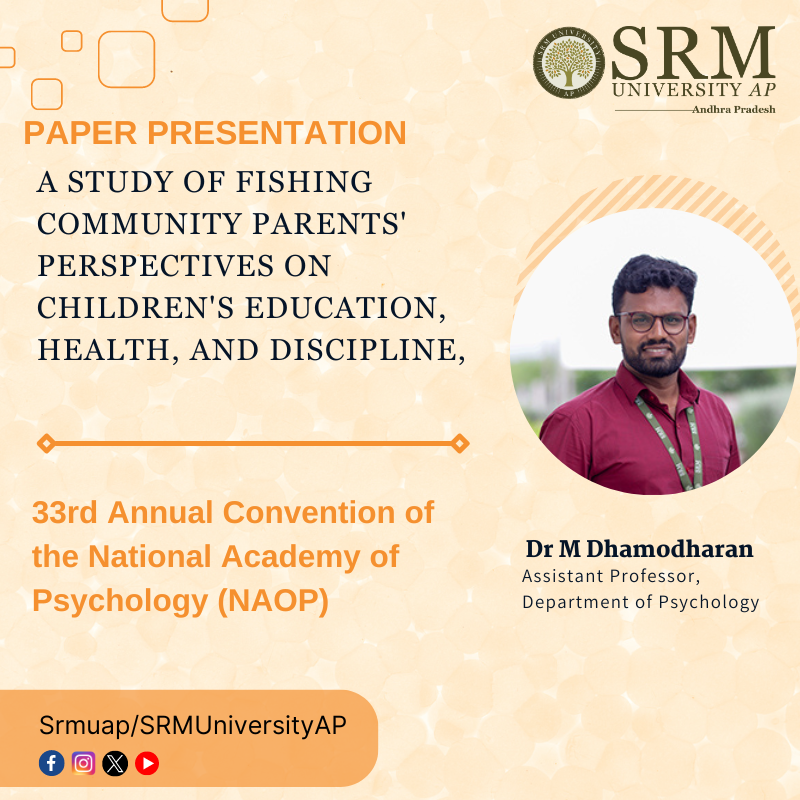
The Department of Psychology at SRM University-AP is pleased to announce Dr Dhamodharan’s pivotal insights, which surfaced at the culmination of the 33rd Annual Convention of the National Academy of Psychology (NAOP), orchestrated by the Department of Applied Psychology at GITAM School of Humanities and Social Sciences, Vishakhapatnam. Dr Dhamodhran, Assistant Professor at the Department of Psychology published his paper, titled “A Study of Fishing Community Parents’ Perspectives on Children’s Education, Health, and Discipline,” which has received profound attention for its insightful analysis.
Abstract:
The Sustainable Development Goals (SDGs) prioritise addressing poverty, promoting good health, and ensuring quality education, among other objectives. However, coastal villages often experience profound socio-economic, financial, and educational disadvantages, leading to recurring financial hardships. The literacy levels within fishing communities are notably deficient, exacerbating challenges in accessing fundamental amenities such as clean drinking water, adequate shelter, educational opportunities, and general well-being. The pervasive poverty and vulnerability prevalent in these areas significantly impede children from fishing villages from regularly attending school, thereby impacting their overall health, educational attainment, and mental well-being. The present study explains the fisher community’s parental perceptions about children’s education, health, and corporal punishment. A cross-section design was used. Samples were selected from four clusters (N = 100, each cluster = 25) from Tamil Nadu and Puducherry. A semi-structured interview method was used. The data were analysed with SPSS and thematic analysis. The result of the study indicates that most of the fisher parents are uneducated, and parents give importance to their children’s education, health, and career choices. Lack of proper income, lack of awareness about academic guidance, corporal punishment, and child rights in the community. The study suggests developing more intervention programmes at the family, school, and community levels to improve the fishing community families and the well-being of the children.
Continue reading →


